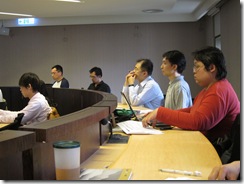2010.04.17 Future Connect: Review of Social Networking Today, Tomorrow and Beyond
【Forum】Future Connect: Review of Social Networking Today, Tomorrow and Beyond
April 17, 2010, the “Future Connect: Review of Social Networking Today, Tomorrow and Beyond” Forum was co-hosted by the School of Philanthropy of Dharma Drum University, the Frontier Foundation, and Nectivism.com.tw. There were about thirty participants, including friends from United Way of Taiwan, Harmony Home Association, Persons with HIV/AIDS Rights Advocacy Association of Taiwan, Dharma Drum Mountain Teachers’ Club, Taiwan Compassion International Foundation, Cardinal Tien Foundation, and China Trust Foundation, etc.
Other types of behavior that have a higher impact on the public domain include organizing, mobilizing, finding resources, professional management, expressing opinions, performing, debating, creating, producing, cross-region/nation interaction, etc.
Contrasting to individuals’ behavior, the reasons for which NGOs used social networking services were associated with purposes such as outreaching, resource mobilization, acquiring information, communication strategy, fund-raising, coordination, group support, strategic alliance with social networking service providers, providing consultation, policy debating, voting, facilitating decision-making, etc.
At the event, Liu Jiangliang, the Internet marketing manager from Inetasia Solution in Shanghai, Hsu Shengjian from mybloggercon.com in Malaysia, Yin She, founder of www.ecauses.org in Beijing, Ilya Lee in the U.S., the project manager at the Institute of Information Science of Academia Sinica, and Mo Kwan Tai who had flown in from Hong Kong especially for this event used Skype to participate in the forum to share the special circumstances facing the different groups of Chinese communities all over the world. The ethnic politics in Malaysia, the censorship of the Internet in China, and the roles of independent media were addressed.
In addition, many important issues were raised and discussed, including the influence by mainstream media, the debate whether the mainstream media would be marginalized by social networking services, the phenomenon of “slactivism,” how NGOs can use Facebook to do branding, the strategies to integrate the virtual and the real world, and why the newly established NGOs were found to be more actively using social networks to bring more attention to their causes compared to the more established and reputable NGOs.
Funded by the “aids2031” consortium and implemented by the US-based Communication for Social Change Consortium, “Future Connect” is an international research project on social networking. Five countries (Brazil, India, South Africa, Thailand, and the United Kingdom) have engaged in the research from 2007 to 2009, with the purpose to understand how to make better use of Social Network Sites/Services (SNS) to communicate social issues. The research team explored how young people are using social networking services as well as how social-purpose organizations are adopting communication technologies in scaling up social impact. This research also made recommendations regarding ways to better communicate with young generations through social networking services. Ann Kao is responsible for the research in Thailand and issues concerning social networking behavior of the Chinese community. The results from this forum provided valuable feedback for the research. (Leemen/Taipei)



